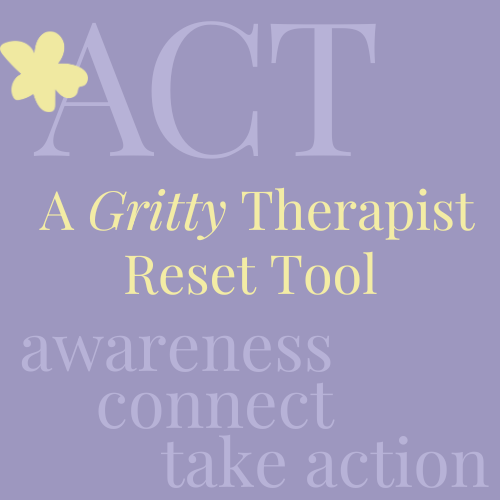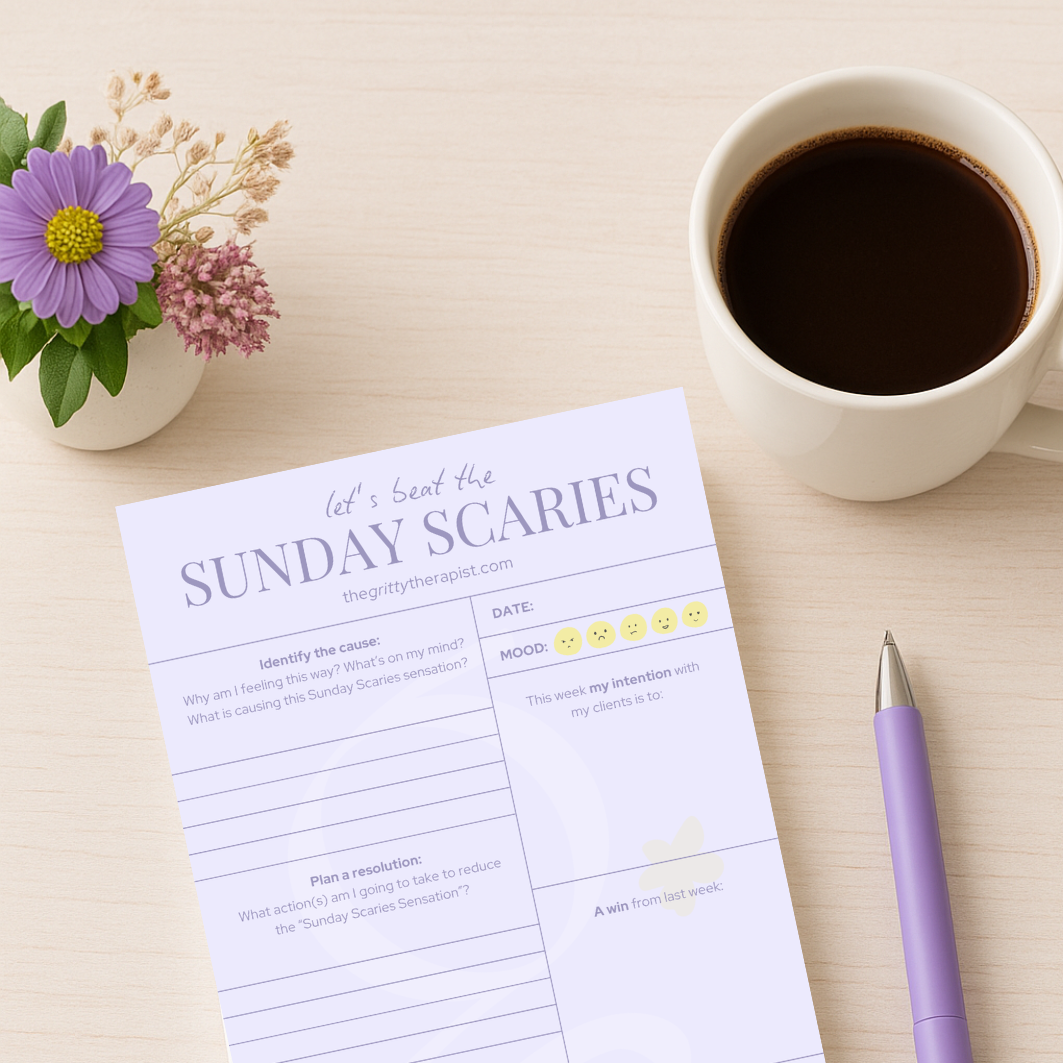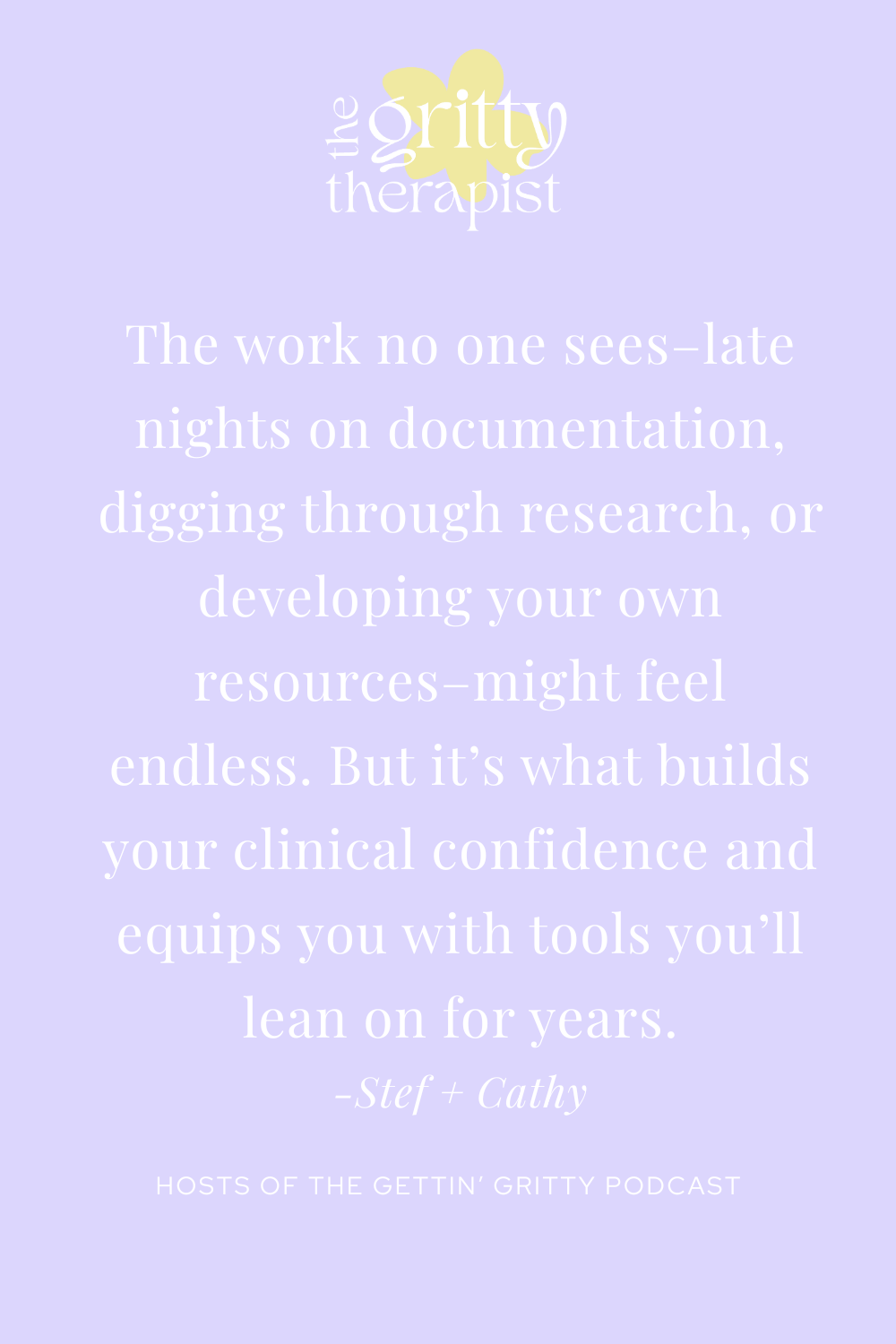How We Built Our Grit as Therapists (+ Why It Matters for You)
Let’s be real: therapy textbooks don’t warn you about crying in the principal’s office on your third day of teaching… or surviving breakfast duty on syrup day. They don’t tell you how to push through writing a clinical manual when you’re sick in bed, or what it feels like to open a therapy practice in the middle of a pandemic.
But those are the moments that actually build grit–the kind that keeps you steady in the therapy room when everything feels messy.
In this first episode of The Gettin’ Gritty Podcast, we (Stef & Cathy) pull back the curtain on our own journey: the mistakes, the awkward jobs, the late-night writing, and the risks that shaped us into the therapists (and supervisors) we are today.
Here’s what you’ll walk away with from this episode/blog:
How everyday, unglamorous tasks (yes, even pencil sharpening) prepare you for clinical confidence.
Why taking risks before you feel “ready” builds resilience.
How research, writing, and the work no one sees strengthen your grit.
Why community and supervision are essential for therapist growth.
A reminder that you don’t have to have it all figured out to make an impact.
So grab your coffee, pull up a chair, and let’s get gritty…
1. Therapist Grit Comes From the Messy Middle (Yes, Even School Bus Duty)
We didn’t start our careers in glamorous private practice offices with curated throw pillows. We started as school counselors–juggling bus duty, breakfast duty, and the kind of cafeteria chaos only seventh graders can create when the chocolate milk runs out.
Cathy spent seven years on breakfast duty, memorizing every kid’s name as they walked through the door. By the time she left, she knew not only the students, but their siblings and families.
Stef remembers pushing garbage cans around the lunchroom, crying in the principal’s office her first week as a teacher, and realizing: this job is gritty whether you want it to be or not.
👉 Takeaway for therapists: The unglamorous parts of your job aren’t wasted. Greeting kids, writing endless notes, or doing the “extra” stuff you didn’t sign up for–it’s building your endurance, empathy, and ability to connect. That’s grit training in disguise.
2. Risk-Taking is Part of the Job
Fast forward to March 2020. The world was shutting down. The NBA season was canceled. Everyone was panicking. And what did we decide to do? Open a brand-new therapy practice: The Cord.
We had already been planning for nearly a year, so when the pandemic hit, we didn’t back down. We opened virtually, reopened in person faster than most (with every precaution we could manage), and somehow kept growing into multiple sites across Nebraska.
👉 Takeaway for therapists: You will rarely feel “ready” to take the next step. Starting your private practice, running a group, or trying a new modality often feels risky. But resilience isn’t built in perfect conditions–it’s built when you say yes in uncertainty.
3. Research and Writing Aren’t Glamorous (But They Matter)
Before The Cord, we co-founded the Attachment and Trauma Center of Nebraska. That season came with grit lessons of its own:
We wrote a parenting manual and a therapist manual. Spoiler: writing books is not fun. Stef even remembers finishing deadlines while sick in bed, papers spread everywhere…it was a mess.
We launched a research project on our protocol, which ended up published. Those hours of supervision, trial, error, and writing laid the foundation for what we do now in therapy rooms every day.
👉 Takeaway for therapists: The work no one sees–late nights on documentation, digging through research, or developing your own resources–might feel endless. But it’s what builds your clinical confidence and equips you with tools you’ll lean on for years.
4. You Can’t Build Grit Alone
One of the biggest turning points in our journey was finding supervision with Deborah Wesselmann, known for her EMDR work with kids.
We spent Saturday mornings in supervision–unpaid, volunteering our time–because we were hungry to learn. And those sessions changed everything. They helped us see middle school cafeteria meltdowns not as “kooky seventh-grade behavior” but as real-time trauma responses.
And along the way, we found each other. From co-interviewing for jobs, to sharpening hundreds of pencils side by side, to co-founding practices and now launching this podcast, we learned grit grows faster in community.
👉 Takeaway for therapists: Supervision, peer groups, or even one trusted colleague who “gets it” can make the difference between burnout and resilience. You don’t have to gut this out alone.
5. You Don’t Have to Have It All Figured Out
Here’s the truth: when we jumped from school counseling into clinical work, we had no idea what a 9083 was. We were terrified of taking notes. We had to learn billing, parent work, and everything else on the fly.
But here’s the thing: we didn’t quit. We went to trainings, asked dumb questions, made mistakes, and kept showing up. That’s what grit really looks like–not having every answer, but choosing to stay anyway.
👉 Takeaway for therapists: It’s okay to feel unprepared. Grit isn’t about perfection–t’s about showing up scared, asking for help, and learning as you go.
Why We Started The Gritty Therapist
From cafeteria duty to opening practices during a pandemic, we’ve gained grit the hard way. And now, we want to pass it on.
The Gritty Therapist is here to give you:
Free clinical resources that will help you tomorrow (did you get our latest free resource on the 7 ways to get gritty?)
Honest stories (the kind you won’t hear in a grad school textbook).
Encouragement to keep going when you feel like you don’t know enough, aren’t doing enough, or might burn out.
Because here’s the truth: we’ve all left sessions thinking, “What do I do now?” But you don’t have to stay stuck there.
Talk soon,
Stef + Cathy, your Gritty Girls
So if you’ve ever thought, “I don’t know enough,” or felt like there’s a gap between theory and practical tools that you can start using tomorrow in client sessions, then we have some clinical resources that could work really well for you…👇






